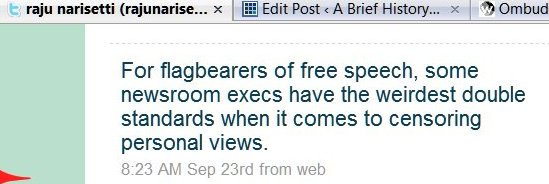Here is a very solid explanation of why the files were leaked by an insider at CRU.
The released emails are a gold mine for a system administrator or network administrator to map. While none of the emails released contained headers, several included replies that contained the headers of the original emails. An experienced administrator can create an accurate map of the email topography to and from the CRU over the time period in question, 1998 thru 2009.
The entire post is a detailed explanation which is easy for a unix user to understand.
POP deletes email on the server usually after it is downloaded. Modern POP clients do have an option to save the email on the server for some number of days, but Eudora Light 3.0.3 did not. We can say that Professor Davies’ emails were definitely removed from the server as soon as “Send/Recv” was finished.
This revelation leaves only two scenarios for the hacker:
Professor Davies’ email was archived on a server and the hacker was able to crack into it, or
Professor Davies kept all of his email from 1999 and he kept his computer when he was promoted to Pro-Vice Chancellor for Research and Knowledge Transfer in 2004 from his position as Dean of the School of Environmental Sciences.
The latter scenario requires that the hacker would have had to know how to break into Prof. Davies’ computer and would have had to get into that computer to retrieve those early emails. If that were true, then the hacker would have had to get into every other uea.ac.uk computer involved to retrieve the emails on those systems. Given that many mail clients use a binary format for email storage and given the number of machines the hacker would have to break into to collect all of the emails, I find this scenario very improbable.
Which means that the mail servers at uea.ac.uk were configured to collect all incoming and outgoing email into a single account. As that account built up, the administrator would naturally want to archive it off to a file server where it could be saved.
The details of how these files were configured make it very unlikely an outsider hacked them.
So given the assumptions listed above, the hacker would have to have access to the gateway mail server and/or the Administration file server where the emails were archived. This machine would most likely be an Administrative file server. It would not be optimal for an Administrator to clutter up a production server open to the Internet with sensitive archives.
This means it is very unlikely that the server which had the e-mail archive was connected to the internet.
The ./FOIA/documents directory is a complete mess. There are documents from Professor Hulme, Professor Briffa, the now famous HARRY_READ_ME.txt, and many others. There seems to be no order at all.
One file in particular, ./FOIA/documents/mkhadcrut is only three lines long and contains:
tail +13021 hadcrut-1851-1996.dat | head -n 359352 | ./twistglob > hadcrut.dat
# nb. 1994- data is already dateline-aligned
cat hadcrut-1994-2001.dat >> hadcrut.dat
Pretty simple stuff, get everything in hadcrut-1851-1996.dat starting at the 13021st line. From that get only the first 359352 lines and run that through a program called twistglob in this directory and dump the results into hadcrut.dat. Then dump all of the information in hadcrut-1994-2001.dat into the bottom of hadcrut.dat.
….Except there isn’t a program called twistglob in the ./FOIA/documents/ directory. Nor is there the resultant hadcrut.dat or the source files hadcrut-1851-1996.dat and hadcrut-1994-2001.dat.
This tells me that the collection of files and directories in ./documents isn’t so much a shared directory on a server, but a dump directory for someone who collected all of these files. The originals would be from shared folders, home directories, desktop machines, workstations, profiles and the like.
Remember the reason that the Freedom of Information requests were denied? In email 1106338806.txt, Jan 21, 2005 Professor Phil Jones states that he will be using IPR (Intellectual Property Rights) to shelter the data from Freedom of Information requests. In email 1219239172.txt, on August 20th 2008, Prof. Jones says “The FOI line we’re all using is this. IPCC is exempt from any countries FOI – the skeptics have been told this. Even though we (MOHC, CRU/UEA) possibly hold relevant info the IPCC is not part our remit (mission statement, aims etc) therefore we don’t have an obligation to pass it on.”
Is that why the data files, the result files and the ‘twistglob’ program aren’t in the ./documents directory? I think this is a likely possibility.
This file existed because someone was planning to honor the FOIA request. Then, it was denied.
The only reasonable explanation for the archive being in this state is that the FOI Officer at the University was practising due diligence. The UEA was collecting data that couldn’t be sheltered and they created FOIA2009.zip.
It is most likely that the FOI Officer at the University put it on an anonymous ftp server or that it resided on a shared folder that many people had access to and some curious individual looked at it.
If as some say, this was a targeted crack, then the cracker would have had to have back-doors and access to every machine at UEA and not just the CRU. It simply isn’t reasonable for the FOI Officer to have kept the collection on a CRU system where CRU people had access, but rather used a UEA system.
Occam’s razor concludes that “the simplest explanation or strategy tends to be the best one”. The simplest explanation in this case is that someone at UEA found it and released it to the wild and the release of FOIA2009.zip wasn’t because of some hacker, but because of a leak from UEA by a person with scruples.
Diogenes searched the world for an honest man. He seems to have found one (or an honest woman) at University of East Anglia.
